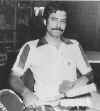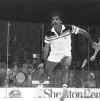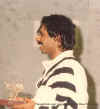| the-south-asian.com NOVEMBER 2001 | ||
| about us contact us data bank past issues the craft shop the print gallery | ||
|
NOVEMBER 2001 Contents Women's Issues Muslim
Women challenge
-Internet Banking & E-Govt in south Asia
Books
|
Page 7 of 8
PAKISTAN SQUASH - THE
KHAN SUPREMACY BY SAJJAD MUNEER (All photos courtesy Squashtalk.com) 1980-97 DOMINATION Peshawar Again During the 1979 World Open in Australia, Torsam Khan elder brother of Jahangir Khan died whilst playing the first round match with Nevin Barbour of New Zealand. Jahangir Khan had earlier, against all expectations travelled as a reserve player to the World Amateur in Australia the same year and ended up winning the Championship as a 15 year old. Pakistan had possibly found another world beater.Torsam's death profoundly shook Jahangir. He vowed to fulfil Torsam's dream of becoming the World Champion. Nur Khan became an active party. It was decided to hire Rehmat Khan as Jahangir¹s coach and send Jahangir to England to prepare. Squash now monopolised Jahangir's existence. He was still at school but had to struggle to keep his mind on his work. No matter how hard he was pushed he was always ready for more. Jahangir was a quiet, serious, withdrawn boy. He was also watchful and attentive. The world of sport had not seen such dedication. Jahangir was forced to lead the life of a hermit, to build his stamina, play a tight game and to frustrate his adversaries by forcing them into errors.Admittedly Geoff Hunt still stood between Jahangir and the world domination. Geoff beat him in the British Open final in 1981 but this is where it all ended. Geoff was 36 years old, the win took everything out of him and he was never to be the same again.The mantle had passed on to Jahangir who was to dominate the sport till 1987 when another Pakistani took over and continues to rule the game till today. His name Jansher Khan.THE PLAYERS: JAHANGIR KHAN Jahangir Khan - the greatest squash player ever. The picture on extreme right is a recent photo taken in Malaysia during a Girls' tournament, where he was a guest.In December 1963, a son was born in Karachi to Roshan Khan. He was named Jahangir, the name stands for "Conqueror" in Urdu. He along with the other JK, Jansher Khan, were to become the two most dominant players 1980onwards. Jahangir Khan is probably the greatest squash player ever. His rise was meteoric. He was a prodigy, a star, a genius, a phenomenon, and a legend, with no intervening lapses. He was hailed as the squash superstar. The fittest man on earth. The finest sportsman ever. A symbol of athletic perfection. The world champion of world champions. Jahangir not only dominated the sport, he redefined it. In 1979, he won the World Amateur title at the age of fifteen. Two years later, in Toronto, he became the youngest ever winner of the World Open Championship. Less then six months after that, he collected his first British Open . Still only twenty, his rule was absolute. His undefeated run stretched to an incredible five years, seven months and one day.During that period, he played with such devastating authority that only one player - Hiddy Jahan took him to five games. Those who had the temerity to filch a game from him were severely punished in the next encounter. Those, like Gamal Awad, who boasted that they would bring him down, were themselves ground into submission. During the Patrick International Festival final at Chichester in 1983, the Egyptian pushed himself to the limit in a marathon that lasted two hours and forty-six minutes, the longest match on record. Jahangir was equal to the challenge and won 3-1. A fortnight later, they met again in the final of the British open at Derby Assembly Rooms. Shattered by his earlier defeat, Awad could only put up a token resistance. He was never the same player after that ordeal in Chichester.As he scorched his way to sporting immortality, Jahangir left a trail of over five hundred successive victories behind him. Week after week, he put his life on the line and came through unscathed. His command was total. He created an enormous psychological barrier for his opponents. All that they could hope for were respectable losing scores against him. If they met Jahangir Khan in the early stages of a tournament, they knew that they would be on their way home the next day. He had a happy knack of simplifying other people's travel arrangements.Defeat came one day. Appropriately, it was in France, a country seasoned in violent overthrow. The date was 11 November 1986. The venue was Palais des Sports in Toulouse. The occasion was the final of the UAP World Open. The score was 9-5,9- 7,7-9,9-1. The victor was Ross Norman of New Zealand. It was the most sensational result in the annals of the game. Sheer amazement soon gave way to an odd sense of relief. Jahangir Khan was human. His detractors were delighted. They felt that his defeat was long overdue. In their view, his reign had always been rather suspect. They argued that his pre-eminence was due to the flatness of the surrounding countryside. He had no real competition. Old masters were on their way down. New, thrusting, young talents had not yet matured. He did not even have to beat some players. They succumbed willingly to his reputation. This is not true, forJahangir played and beat the ageing greats when they too were in their prime as players. He became simply too good for them.However Jahangir became the victim of the same high standards he had set for others to follow. The change became evident when the Squash world started to throw players like Chris Dittmar, Rodney Martin, Chris Robertson, Gwain Briars, and between them all combined to give a new dimension in squash excellence to the world. Jahangir beat them many more times than he lost to them. His feats are astounding. Ten successive British Opens, six World Opens, 13 Pakistan Opens and he rounded all this off by leading Pakistan to a historic team triumph in the World Team Championship in 1993.Jahangir was truly the greatest squash player of his generation if not the greatest squash player ever. He was the world’s first squash millionaire. He also took over the championship of the North American (hardball) game the first time he ever played it
Copyright © 2000 - 2001 [the-south-asian.com]. Intellectual Property. All rights reserved. |
|




